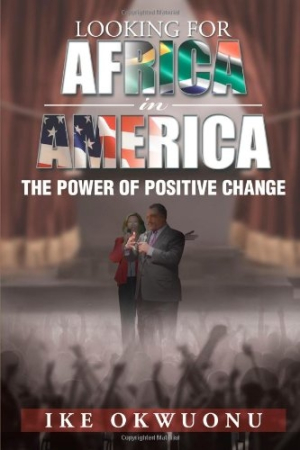Looking for Africa in America
The Power of Positive Change
A fresh and provocative book examines cultural values that African Americans have lost in the post-slavery generations.
A young man must return to the village of his slave ancestors to discover the original cultural values lost to generations of African Americans.
Mental-health therapist and first-time author Ike Okwuonu tackles difficult issues of race, culture, values, and ethnic identity in Looking for Africa in America: The Power of Positive Change. He broaches the complicated impact of America’s history of slavery on the African American identity, presenting evidence of appreciable differences between the identities of new immigrants and those whose ancestors arrived in America unwillingly, centuries ago. Specifically targeting the insidious harm done to the slave descendants’ collective psyche, he offers the fictionalized tale of one young man’s journey to “find Africa” within himself and re-approach life in America from a new perspective.
As a native Nigerian, Okwuonu is among the “new” African-American immigrants he contrasts with those whose families have been in the United States for generations. A founding member of Oklahoma’s Anambra State Family Association, he maintains ties to his original home country and believes that such attachments are essential not only to his own well-being but to the welfare of people everywhere. He proposes that slavery stripped the captive African of his original family structure and cultural identity.
Compounding the damage through “inhuman treatment” and forced compliance with rigid Western cultural structure, “the white man” imposed a “culture of fear, disrespect, and anger” that African Americans then transferred to their children over the course of ensuing generations. Never allowed, as other immigrants traditionally have been, to add their own culture to America’s “melting pot,” African Americans remain an alienated group of perceived “second-class citizens,” unable to fully take advantage of the numerous freedoms and liberties America has to offer.
The theories Okwuonu presents are intriguing and thought-provoking, but their impact is diluted in the presentation. Looking for Africa in America is written as the fictional story of Johnson, a young African American deeply dissatisfied with the emptiness of his life. Because most of the story is commentary about Johnson, the character never fully comes to life. Explanations of his motivation—or lack thereof—feel heavy-handed in their repetition, promoting the author’s theories but never providing any depth or vitality to the character himself.
Johnson’s trip to the village of his slave ancestors, where he intends “to reunite with his roots,” offers excellent insight into African cultural customs and rituals. Okwuonu explains traditions ranging from the African marriage-contracting process and dowry negotiation to the masquerade ritual and traditional music and dance. Enlightening detail provided here brings more to the story than Johnson’s own participation, which never feels quite realistic. A hurried ending, during which the young man returns to America a changed man, is less than satisfying.
Okwuonu reveals a fascinating perspective on life as an African American, and his voice is a welcome one. The delivery, however, is less than effective. Ultimately, Looking for Africa in America is social commentary inadequately disguised as fiction. The front cover, featuring a picture reminiscent of an inspirational or evangelical meeting, and the subtitle, The Power of Positive Change, suggest a different focus than the book provides. Still, despite unnecessary fictionalization, the theories the author promotes are fresh and provocative.
Reviewed by
Cheryl Hibbard
Disclosure: This article is not an endorsement, but a review. The publisher of this book provided free copies of the book and paid a small fee to have their book reviewed by a professional reviewer. Foreword Reviews and Clarion Reviews make no guarantee that the publisher will receive a positive review. Foreword Magazine, Inc. is disclosing this in accordance with the Federal Trade Commission’s 16 CFR, Part 255.

